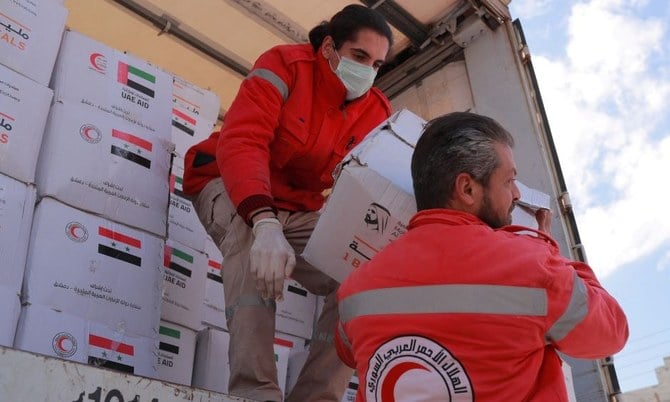
A post shared by a friend on Facebook read: “Three empty chalets by the sea in Latakia, if you know people needing a place to stay please give them my number.” “Our church has reopened its basement shelters, for those with nowhere to go” read another, this time from Aleppo, a city that had no shelters in 2010.
As the estimated number of lives lost to the Feb. 6 earthquakes in Turkiye and Syria started to rise, so too did the cries for help. These two posts, and others which appeared promising, were soon drowned out by appeals for news about lost loved ones. An epic tragedy is gradually unfolding.
That the areas affected are larger in Turkiye than they are in Syria is a fact of geography; so are the numbers of people whose lives were devastated, along with the buildings they inhabited until early last week. But on the local scale, every corner that the earthquake has touched is living a tragedy of epic proportions. On the Turkish side, politicians assert, the damage would overwhelm any government. One can only imagine how much more difficult it must be for a fragmented country, across the border, whose economy and infrastructure have been all but destroyed by more than a decade of intractable war and suffocating sanctions.
Sanctions, meant to bring those holding power in Syria to concede, have in reality brought the embattled population to its knees. Poverty is estimated at a whopping 80 percent, but for many it is malnutrition, the lack of electricity and running water, or the scarcity of medication that are proving fatal. This winter in particular, large swaths of the population have been struggling to find or afford fuel for heating. The 200 percent devaluation of the Syrian pound against the US dollar last summer was further exacerbated by another 20 percent over the course of the early winter weeks. It was hard to imagine how much worse things could get.
The announced number of people confirmed to have died continues to rise by the thousands. Between stomach-churning number increases and headlines about messages of solidarity pouring in from world leaders, only the Turkish president is mentioned as a recipient. No condolences for the ruler in Damascus, who has been persona non grata in international political circles for more than a decade now. Politics, I think naively, must prevent leaders of countries who have severed diplomatic ties with Syria from stating public support. Surely, I say to myself and to others, the urgent rescue aid pledged from around the world will not stop at the borders. But stop at the borders it did, for a crucial, fatal week. I am struggling to comprehend.
On the one hand, a report said the UN needed an appeal for help from inside the country to move in. On the other hand, a reporter inside Syria said the government had issued calls for help from the UN and other international bodies but received none. I struggled to understand.
Meanwhile, stories about people hearing their loved ones crying for help from under the rubble, pleading for rescue aid, gradually faded into the background. The nightmares, the guilt, the trauma upon trauma those survivors must experience will take generations to heal. Ten days on, parts of Syria are yet to receive any aid. Survivors, miraculously, continue to be found. But 10 days is the limit for many rescue teams, meaning their mission is coming to a close.
The disbelief caused by a catastrophic earthquake pales in comparison to that caused by human inaction. The slowness, and in some cases continued lack of announced aid to the beleaguered citizens of Syria, is shocking. Aid agencies, people in the know reveal, are thinking twice before moving in, although nothing evident should stop humanitarian aid from crossing the borders. Time is tight, and so are sanctions. But the lack of political will remains the most difficult thing to comprehend. Like most bureaucratic hurdles, logistical details put cogs in the wheels of life, even in calamity. On the ground, people are helping people. Schools, churches, mosques and community halls have been opened across Syria, and volunteers are working to distribute any aid they receive.
The disbelief caused by a catastrophic earthquake pales in comparison to that caused by human inaction.
Tala Jarjour
People who have managed to leave their homes are now afraid to go back, as buildings continue to collapse. After many nights in freezing temperatures, thousands are in danger of losing their lives. With the number of deaths now in the tens of thousands, the loss of life among survivors risks becoming even more catastrophic, the World Health Organization warns.
Meanwhile, pictures from Aleppo show a disproportionate glimpse of the misery and hope. Elderly women, in full outdoor clothing and under thick bedding, crouch over rows of tight wooden classroom desks. Meager slabs of bread are handed out by volunteers. A small boy huddles in the corner under a blanket. As he looks up while being handed half a piece of bread, the frozen shock on his face is unmistakable. Syrians stopped expecting the world to acknowledge their suffering a long time ago. A temporary and partial lifting of sanctions has been announced by the US Congress, loosening, if only for a while, the noose on aid. But after a week had passed with those holding aid wringing their hands at the fences, it is hardly believable to a little boy in Aleppo that someone is really extending a hand.
Tala Jarjour, Ph.D. (cantab), is the author of “Sense and Sadness: Syriac Chant in Aleppo.” She is Visiting Research Fellow at King’s College London and Associate Fellow at the Yale College.












